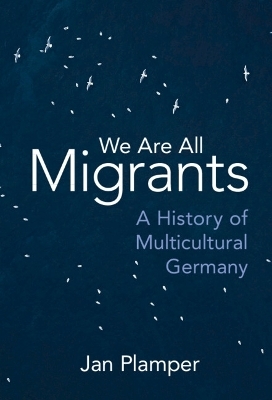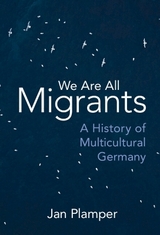We Are All Migrants
A History of Multicultural Germany
Seiten
2023
Cambridge University Press (Verlag)
978-1-009-24229-5 (ISBN)
Cambridge University Press (Verlag)
978-1-009-24229-5 (ISBN)
We Are All Migrants is the first narrative history of multicultural Germany, told through life-stories, charting the groups and waves of post-1945 migration to Germany, West and East, and showing that the story of immigration to Germany is a success story.
In 2015, Germany agreed to accept a million Syrian refugees. The country had become an epicenter of global migration and one of Europe's most diverse countries. But was this influx of migration new to Germany? In this highly readable volume, Jan Plamper charts the groups and waves of post-1945 mobility to Germany. We Are All Migrants is the first narrative history of multicultural Germany told through life-stories. It explores the experiences of the 12.5 million German expellees from Eastern Europe who arrived at the end of the Second World War; the 14 million 'guest workers' from Italy and Turkey who turned West Germany into an economic powerhouse; the GDR's Vietnamese labor migrants; and the 2.3 million Germans and 230,000 Jews who came from the Soviet Union after 1987. Without minimizing racism, We Are All Migrants shows that immigration is a success story – and that Germany has been, and is, one of the most fascinating laboratories on our planet in which multiple ways of belonging, and ethnic, national, and supranational identities, are hotly debated and messily lived.
In 2015, Germany agreed to accept a million Syrian refugees. The country had become an epicenter of global migration and one of Europe's most diverse countries. But was this influx of migration new to Germany? In this highly readable volume, Jan Plamper charts the groups and waves of post-1945 mobility to Germany. We Are All Migrants is the first narrative history of multicultural Germany told through life-stories. It explores the experiences of the 12.5 million German expellees from Eastern Europe who arrived at the end of the Second World War; the 14 million 'guest workers' from Italy and Turkey who turned West Germany into an economic powerhouse; the GDR's Vietnamese labor migrants; and the 2.3 million Germans and 230,000 Jews who came from the Soviet Union after 1987. Without minimizing racism, We Are All Migrants shows that immigration is a success story – and that Germany has been, and is, one of the most fascinating laboratories on our planet in which multiple ways of belonging, and ethnic, national, and supranational identities, are hotly debated and messily lived.
Jan Plamper is Professor of History at the University of Limerick. He specializes in migration history, the history of emotions and the senses, and Russian history. His other books include The Stalin Cult: A Study in the Alchemy of Power (2012) and The History of Emotions: An Introduction (2015).
Introduction; 1. We are all migrants, almost everywhere, almost always – especially the Germans; 2. Twelve and a half million in six years; 3. Labor migration to West Germany; 4. Labor migration to East Germany; 5. Asylum; 6. Germans there, Russians here; 7. Jewish Germaniya; 8. Welcoming culture; Conclusion; Index.
| Erscheinungsdatum | 13.03.2023 |
|---|---|
| Zusatzinfo | Worked examples or Exercises |
| Verlagsort | Cambridge |
| Sprache | englisch |
| Maße | 154 x 235 mm |
| Gewicht | 580 g |
| Themenwelt | Geschichte ► Allgemeine Geschichte ► Zeitgeschichte |
| Geisteswissenschaften ► Geschichte ► Regional- / Ländergeschichte | |
| Sozialwissenschaften ► Ethnologie | |
| Sozialwissenschaften ► Soziologie | |
| ISBN-10 | 1-009-24229-6 / 1009242296 |
| ISBN-13 | 978-1-009-24229-5 / 9781009242295 |
| Zustand | Neuware |
| Haben Sie eine Frage zum Produkt? |
Mehr entdecken
aus dem Bereich
aus dem Bereich
Gewalt, Umwelt, Identität, Methode
Buch | Softcover (2024)
Spector Books OHG (Verlag)
CHF 49,95
wie Freud im Kollektiv verschwand
Buch | Hardcover (2024)
Klett-Cotta (Verlag)
CHF 34,95




